By Burnett Munthali
The Democratic Progressive Party (DPP) has outlined a comprehensive development agenda guided by Malawi 2063, which will be anchored on four main pillars: Agricultural Productivity and Commercialisation, Industrialisation, Urbanisation, and Decentralisation.
Agricultural Productivity and Commercialisation remains a central focus of the DPP’s manifesto, reflecting the sector’s pivotal role in Malawi’s economy.
Over the past ten years, agriculture has contributed an average of 30 percent of the country’s Gross Domestic Product (GDP), underlining its significance in driving national growth.

However, the sector faces major challenges, including low productivity, over-reliance on smallholder farmers, and limited crop diversity, with maize dominating as the staple food crop.
Despite maize’s prominence, other crops such as cassava, rice, sweet potatoes, sorghum, bananas, and Irish potatoes thrive in Malawi’s fertile soils, yet have been underutilised.
Tobacco remains the country’s primary export crop, contributing more than 40 percent of annual export earnings, followed by tea, sugar, dried legumes, cotton, and nuts.
The DPP government pledges to facilitate agricultural transformation through improved productivity, sustainability, and commercialisation.
Its goal is to create an enabling environment for economic activities that increase food and nutrition security while promoting sustainable growth in the agricultural sector.
This transformation is expected to translate into improved incomes for farmers and actors along the agricultural value chain, contributing to wealth creation nationwide.
The manifesto highlights plans to support emerging medium-scale farming operations that will engage in intensive, commercially-oriented agriculture, including greenhouse farming, livestock production, fish farming, horticulture, and legume cultivation.
The party promises to implement a “Green Revolution” to modernise and diversify Malawi’s agricultural sector.
Specific strategies include promoting crop diversification of high-value crops to enhance food security, nutrition, and household incomes.
Different regions will be prioritised with tailored cropping systems; for instance, the Lower Shire Valley will focus on bio-fortified sorghum and pearl millet, combined with conservation agriculture, stress-tolerant crop varieties, and cereal-legume intercropping.
In the Lakeshore, Middle, and Upper Shire regions, drought-tolerant Pro-Vitamin A maize, improved rice varieties, and bio-fortified sweet potatoes will be promoted alongside intercropping systems with maize, cassava, pigeon pea, beans, groundnuts, and cotton.
The DPP manifesto also emphasises revitalising the extension system to improve service delivery.
Measures include recruiting and retaining more front-line agricultural staff and specialised workers at district and Extension Planning Area (EPA) levels.
The party plans to resuscitate the former Land Husbandry Training Centre, rehabilitate residential training centres, day training centres, offices, research stations, and staff housing to strengthen agricultural education and extension.
Continuous training for both extension staff and farmers will be prioritised to ensure increased adoption of modern agricultural technologies.
Research-extension-farmer linkages will be strengthened to improve technology transfer across various agricultural and aquatic value chains.
The DPP further promises to review the Extension Policy to align it with contemporary agricultural needs.
Budgetary allocations for agriculture and irrigation development will be increased, with plans to expand the land under commercial agriculture from the current 20 percent to 40 percent by 2030.
Conclusion
The DPP manifesto presents an ambitious roadmap for transforming Malawi’s agriculture into a diversified, commercially viable, and sustainable sector.
By emphasising productivity, crop diversification, modern farming techniques, and strengthened extension services, the party seeks to create wealth, enhance food security, and foster inclusive growth.
If implemented effectively, this agenda could reshape Malawi’s agricultural landscape, providing both smallholder and medium-scale farmers with opportunities to participate in a more dynamic and prosperous economy.


